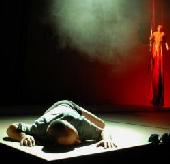SEARCH
REVIEWS
FEATURES
NEWS
Etcetera and
Short Term Listings
LISTINGS
Broadway
Off-Broadway
NYC Restaurants
BOOKS and CDs
OTHER PLACES
Berkshires
London
California
DC
Philadelphia
Elsewhere
QUOTES
On TKTS
PLAYWRIGHTS' ALBUMS
LETTERS TO EDITOR
FILM
LINKS
MISCELLANEOUS
Free Updates
Masthead
Writing for Us
A CurtainUp  London Review
London Review
 London Review
London ReviewThe Odyssey
|
There is nothing sweeter in the end than wife, children, parents, country. There is nothing sweeter than home.
---- Odysseus |

Stephen Noonan as Odysseus and Dave Fishley as Athena
(Photo: Pau Ros) |
The evening begins with an explosively thunderous sea storm. As a shipwrecked Odysseus (Stephen Noonan) writhes on the shore, a masculine Athena (Dave Fishley), bathed in red light, tells us the mythic background. However, the alien country he has just landed upon presents him with a new 21st century trial: the accusation of being an illegal immigrant. In a CCTV-monitored detention centre, a brutal bureaucracy harshly disregards and disbelieves Odysseus' heroic individuality. In order to convince the immigration officials that he is the great general of the Greek army and sacker of Troy, Odysseus tells them his story of his prolonged, frustrated return home.
Odysseus' famous adventures are vividly and imaginatively enacted onstage. Among them are the soporific island of the lotus-eaters. Their mind-altering flowers turn the crew into hippies, asking their commander "Why war, man, why war?" The Cyclops is a terrifying man-eating monster whose single, interrogation headlamp of an eye turns on the audience as well. They come across the witch Circe, where shadow puppets play out this seductive goddess' tendency to subject all visitors to porcine transformation. Journeying into the Underworld, Odysseus meets some eerily-masked dead souls and is treated to a glimpse of his home Ithaca, where his vulnerable but constant wife Penelope is beset by demanding, unremitting suitors. With Mediterranean sunshine and music, this scene really feels like Greece. Next, as they sail past the Sirens, there is wisely no attempt to reproduce their irresistible "melodious poison", but instead we hear the heartbeat of the ear-plugged rowers and see Odysseus straining to be released from his bonds.
David Farr's sensitive reading of Homer does not shirk the ambiguity of war. In Book VIII of the original poem, a disguised Odysseus listens to a bard sing of his own glorious exploits during the Trojan war. Odysseus covers his face with his cloak and weeps, and the imagery likens him to a woman whose husband has been killed in war, her city conquered and herself about to be enslaved. In this way, the victorious hero is identified with the victims of his "heroism".Farr, on the other hand, places an incarcerated Odysseus among asylum-seekers, and the hero thus finds himself at the mercy of the very people he has reduced to permanent homelessness: his vanquished enemy, the Trojans. A young Trojan girl, Maira (Celia Meiras), sings a haunting song about their plight and, raiding the surrounding area for props, re-enacts the "wooden horse catastrophe". Unlike Odysseus, they have no goddess protector or happy ending. The martial victory of war is de-glorified and, as in Homer, a new heroism of endurance and suffering is formulated instead.
Stephen Noonan is perfect as Odysseus, in some ways an ambiguous, understated hero, and the only Homeric character who is described by mental, rather than physical epithets. He is wily, resourceful and opportunistic, offered immortality and gorgeous goddesses, but devoted to his rugged, imperfect home. The rest of the cast are also excellent. They work extremely hard in their various roles and demonstrate a tremendous versatility and energy.
David Farr's writing is clever, amusing and humane, whilst his direction creates a style which is distinctive and richly textured. He is justly being hailed as one of Britain's most innovative directors, able to engage in contemporary issues but never losing sight of his creativity or his sense of humour. This is a fantastically vibrant interpretation of an ancient classic, and a funny, intelligent and moving production.
|
THE ODYSSEY
Directed by David Farr Based on The Odyssey by Homer Starring: Stephen Noonan With: Dave Fishley, Colin Mace, Stuart McLoughlin, Celia Meiras, Mia Soteriou, Peter Troake Design: Angela Davies Music: Stu Barker Lighting: Chris Davey Sound: Nick Manning Choreography: Ann Yee Puppetry: Mervyn Millar Running time: 2 hours and a half with an interval Suitable for Ages 10+ Box Office: 08700 500 511 Booking to 1st April 2006 Reviewed by Charlotte Loveridge based on 1st March 2006 performance at the Lyric Hammersmith, Lyric Square, King Street, London, W6 0QL (Tube: Hammersmith) |





